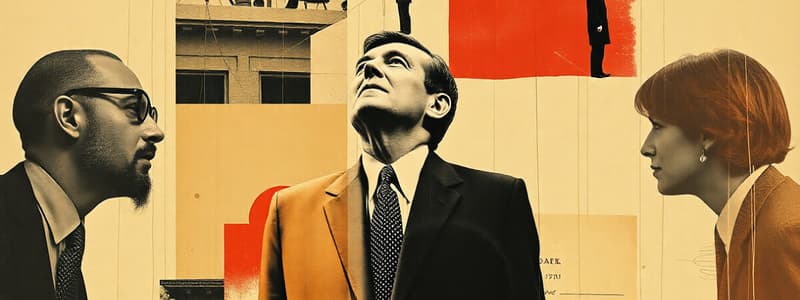Podcast
Questions and Answers
What is Drew’s primary goal for the bus he is steering?
What is Drew’s primary goal for the bus he is steering?
- To create a calm and peaceful environment for the passengers.
- To transform the bus into a fast and competitive machine. (correct)
- To manage the team effectively and keep everyone happy.
- To ensure every worker follows the rules strictly.
According to Ron's philosophy, which worker receives immediate attention?
According to Ron's philosophy, which worker receives immediate attention?
- Riders
- Joggers
- Walkers
- Runners (correct)
What does Ron intend to do with the Riders according to his philosophy?
What does Ron intend to do with the Riders according to his philosophy?
- Kick them off the bus if they do not improve. (correct)
- Dismantle their positions entirely.
- Ignore them while focusing on stronger team members.
- Encourage them to develop into Runners.
What was the primary issue with the Rider mentioned in Ron's anecdote?
What was the primary issue with the Rider mentioned in Ron's anecdote?
How did Ron feel about the Rider's impact on the students?
How did Ron feel about the Rider's impact on the students?
What realization did the speaker come to after working with the Rider?
What realization did the speaker come to after working with the Rider?
Why did the speaker focus on the Runners instead of the Riders?
Why did the speaker focus on the Runners instead of the Riders?
How did the speaker describe the Runners in regard to their workload?
How did the speaker describe the Runners in regard to their workload?
What method did the speaker use to motivate the Runners effectively?
What method did the speaker use to motivate the Runners effectively?
What did the speaker find was true about the Rider’s teaching method?
What did the speaker find was true about the Rider’s teaching method?
What was one key observation about the Runners' performance when given support?
What was one key observation about the Runners' performance when given support?
What was the initial reaction of the administrator toward the Runners and Riders?
What was the initial reaction of the administrator toward the Runners and Riders?
What impact did making a mistake have on Mrs. Sanders, a Runner?
What impact did making a mistake have on Mrs. Sanders, a Runner?
How did the administrator view the mistakes made by the Runners after some time?
How did the administrator view the mistakes made by the Runners after some time?
What did the administrator learn from his own mistake of sending the email to the entire school?
What did the administrator learn from his own mistake of sending the email to the entire school?
Study Notes
The Parable of the Bus
- Ron Clark uses the parable of the bus to explain his philosophy of leading an organization
- He categorizes his team members into Runners, Joggers, Walkers, and Riders, based on their performance and attitude
- Runners are high-performing, energetic, and contribute significantly to the bus's speed
- Joggers are generally effective, but need some help to improve
- Walkers are slow but can be motivated to contribute
- Riders are unproductive and need to be removed from the bus
Focusing on Runners
- Ron Clark's philosophy prioritizes supporting Runners, recognizing their vital role in the organization's success
- Despite their high performance, Runners often require support to maximize their potential
- He provides Runner team members with resources and removes tasks that can be handled by others, freeing them to focus on their core responsibilities
- He acknowledges that Runners are often perfectionists, making them vulnerable to burnout
Recognizing Mistakes
- Ron Clark emphasizes the importance of overlooking mistakes made by Runners, recognizing they're often due to their high workload
- He uses personal experience to illustrate that holding onto mistakes can harm the spirit and performance of Runners
- He encourages Runners to forgive themselves and move on from their mistakes
Leadership Approach
- Ron Clark's leadership approach focuses on fostering a culture of support and recognition for high-performing individuals
- He encourages initiative and innovative thinking by providing a supportive environment for them to try new things
- He advocates for a hands-off approach when it comes to coaching Runners, allowing them to take ownership of their roles
Impact
- Ron Clark's philosophy of prioritizing Runners has created a positive and dynamic environment at his organization
- Runners feel valued and supported, leading to a more energized work culture
- This positive energy then motivates others, creating a ripple effect throughout the organization
- The bus, representing the organization, flies because it's powered by the energy and drive of its Runners
Studying That Suits You
Use AI to generate personalized quizzes and flashcards to suit your learning preferences.
Description
Explore Ron Clark's parable of the bus, which categorizes team members into Runners, Joggers, Walkers, and Riders based on performance and attitude. Discover how focusing on Runners can enhance organizational success while supporting their unique needs.



